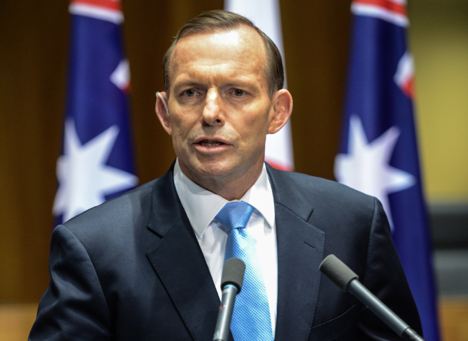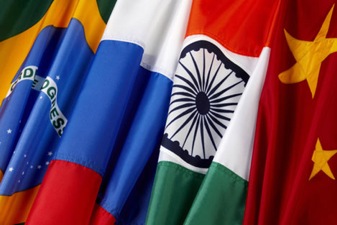How the West plays good cop, bad cop

Is Tony Abbott trying to coax Narendra Modi away from the BRICS? Source: Photoshot / Vostock Photo
In July 1956 the Commonwealth almost split between its white and non-white members over the British-French invasion of Egypt. While India opposed the invasion, Australia and New Zealand backed Britain.
As the crisis simmered, the wily Canadians – although they initially felt a “beloved uncle had been arrested for rape” – decided not to back Britain and instead joined the US in pressing for a ceasefire. Canada’s stand reassured the Asian members of the Commonwealth that the white nations did not hold diametrically opposite world views.
Canada thus played a key role in preventing the dismantling of that absolutely useless group, whose only reason for existence is that four white nations of the erstwhile British Empire get some satisfaction in seeing the monarch of their beloved England preside over the other 50 non-white nations.
Again, in 1958 when Canada’s Prime Minister John Diefenbaker addressed the Indian Parliament, he allayed Indian fears of US intentions in the Cold War.
You can bet on both occasions there was clinking of champagne glasses behind closed doors, with the Canadians telling their colonial cousins: “Mission accomplished.”
Now, fast-forward to 2014. When the BJP’s Narendra Modi was elected the new Prime Minister of India, just imagine what sort of apprehensions must have haunted those stalking the corridors of power in the West. For, the last BJP Prime Minister had set off five nuclear bombs, which catapulted India to the global centre stage.
According to senior journalist and political commentator S. Gurumurthy, the nuclear tests created such confidence and euphoria among Indians living abroad that they invested billions of dollars in India. This in turn attracted foreign multinationals, who fell over each other to invest billions more in the country. Suddenly India was being counted – and courted – as a superpower. All because of five nuclear tests in 1998.
So what does the West do? Because the US had been playing bad cop for over 12 years (denying Modi a visa and by implication portraying India as a rogue nation), the West’s backroom boys despatched Australian Prime Minister Tony Abbott to play good cop.
On September 6, Australia signed a nuclear deal with India, clearing the way for Australian uranium sales. Abbott was all over the place, laying wreaths in Delhi and Mumbai, pumping hands, and even placing his arms around Modi. And he made a startling remark regarding India’s nuclear industry: “It’s not our job to tell India how to conduct its domestic affairs.”
This is the same Australia that described the 1998 tests as a “grotesque status symbol” and an “outrageous act” – despite the glaring hypocrisy of Australia taking shelter under the American nuclear umbrella. In fact, in 2007 prime ministerial candidate Kevin Rudd had thundered he would “tear up” any nuclear deal with India if elected. Rudd, a Christian fundamentalist, did get elected and India-Australia relations nosedived.
So what changed? Modi happened. His address before the Australian parliament was described by the Sydney Morning Herald as a “rock star” performance. If the Speaker of the house had let them, the members “would have whistled, whooped and charged the stage”.
Unfortunately, many Indians get taken in by such commentaries, which are spiels spun on the command given by the western political masters to their local media henchmen and women. How much Modi was influenced by the “standing ovation” (as if there is a sitting one!) remains to be seen but the Indian media was blissfully unaware of the recent history of bad blood between the two nations.
Campaign to bag Brazil
Along with India, the West considers Brazil as one of the weak pillars of the BRICS group. While India is being targeted using the combined influence of the English speaking countries, the West has no such leverage in Brazil. In vast swaths of South America the Americans are particularly loathed. The US, therefore, is trying a new tack there.
Brazil’s Dilma Rousseff is the new Hugo Chavez. Like the coups organised against the late Chilean prime minister, the newly re-elected President of Brazil was the target of a vicious disinformation campaign conducted by the US State Department.
William Endgahl writes in the New Economic Outlook: “Her US-backed campaign rival, Aecio Neves of the Brazilian Social Democracy Party, serves the interests of tycoons and their Washington allies. Neves’ chief economic adviser who would have become Finance Minister in a Neves presidency was Arminio Fraga Neto, a close friend and former associate of George Soros and his Quantum hedge fund. Neves’ senior adviser, and likely Foreign Minister had he won, was Rubens Antonio Barbosa, former Brazil ambassador to Washington and today a Senior Director of ASG based in Sao Paulo.
“ASG is the consulting group of Madeline Albright, former US Secretary of State during the 1999 US bombing of Yugoslavia. Albright, a director of the leading US think-tank, the Council on Foreign Relations, is also chair of the prime US Government “Color Revolution” NGO, the National Democratic Institute. Not surprisingly, Barbosa during the recent campaign called for a strengthening of Brazil-US relations and a diminishing of the strong Brazil-China ties developed by Rousseff in the wake of revelations of US spying by the NSA on Rousseff and her government.”
In fact, on November 2, just days after Rousseff’s hard-fought victory, the US major accounting firm PriceWaterhouseCoopers refused to sign Brazilian oil giant Petrobras’ third-quarter earnings. PWC – one of the most scandal ridden US accouting firms – exceeded its brief and virtually acting as a mouthpiece of the US State Department, demanded a wider investigation into the corruption scandal involving the state-run oil company.
So why is the US so desperate to get rid of Rousseff. According to Endgahl, “It is not merely Rousseff’s alliance with BRICS countries that has made her a prime Washington destabilisation target. Under her tenure, Brazil is moving swiftly to decouple from US NSA electronic surveillance vulnerability.”
The vicious attacks on Rousseff and the desperate wooing of Modi are happening in the backdrop of the unprecedented sanctions against Russia.
China’s next. American fingerprints have also been found all over Hong Kong’s “Umbrella Revolution”. The annual reports of the National Endowment for Democracy, a nonprofit directly supported by Washington, show that the organisation distributed $755,000 in grants in Hong Kong in 2012, and an additional $695,000 last year. That’s enough money to buy a lot of umbrellas.
The good cop, bad cop routine is used by law enforcement agencies all over the world to break suspects and criminals. Used cleverly, it sometimes works in moving the prosecution forward. It’s extremely unlikely to work in Russia and China, where the populations are highly educated, informed and know the history and perfidy of the West.
But India and Brazil are different. While they currently have nationalist leaders committed to the BRICS, there are weaknesses the West could exploit. In India there is a large mass of Macaulayites – Indian in looks but western in outlook – who do not see the dangers posed by westerners. Many Indians – including its diplomats – are easily won over by sweet talking Tony Abbotts.
Brazil’s problem is unique – there’s been a rapid increase in the number of Born Again Protestant churches based in America. The percentage of Brazilian Protestants has risen from virtually nothing three decades ago to an astounding 25 per cent today. Most of the flock attending these American funded churches blindly follow the dictates of their fundamentalist priests, who in turn take their orders from their HQ in America. This time Rousseff won against every obstacle placed in her way by the Americans. However, which way Brazil will swing in a decade’s time is anyone’s guess.
The road to great power status is littered with such minefields.
All rights reserved by Rossiyskaya Gazeta.
Subscribe
to our newsletter!
Get the week's best stories straight to your inbox

